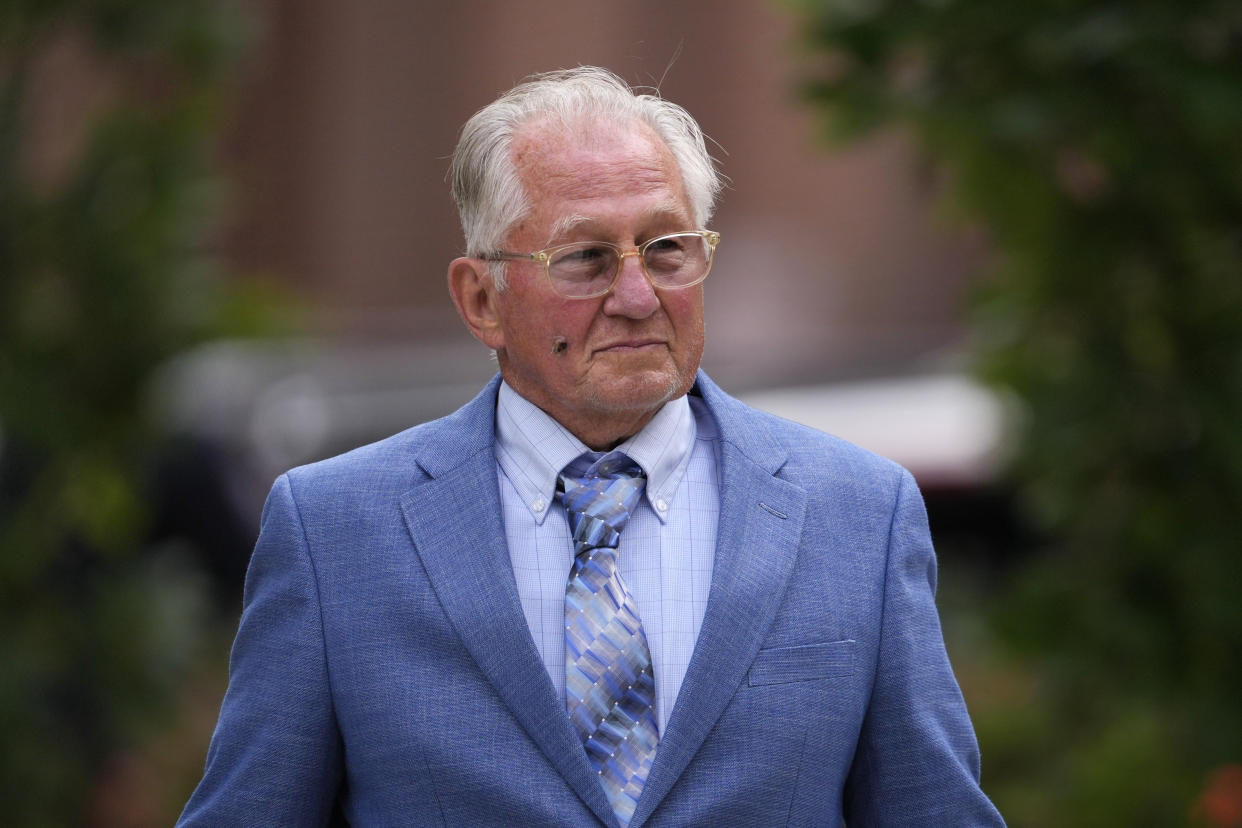From a truck to a trash can to a stranger’s closet: The odd saga of Hunter Biden’s gun

- Oops!Something went wrong.Please try again later.
WILMINGTON, Delaware — Hunter Biden’s high-stakes gun trial began on Thursday with raw, gut-wrenching testimony about his history of addiction to crack cocaine.
It ended with a grumpy octogenarian talking about socks.
The dramatic tonal shift in the criminal trial of the president’s son was the result of prosecutors trying to complete their narrative of what happened over a fateful two-week period in October 2018.
Biden is accused of lying about his drug use when he purchased a pistol on Oct. 12, 2018. Eleven days later, Hallie Biden — who is the widow of Beau Biden and was dating Hunter at the time — found the gun in his truck and tried to get rid of it.
Prosecutors have spent most of the four-day trial trying to prove the depths of Biden’s drug abuse, including around the time he bought the gun. Hallie provided critical testimony on that point Thursday morning.
But later in the day, prosecutors turned to a different part of the story: what happened to the gun after Hallie Biden threw it in a trash can outside a high-end grocery store two minutes from her Wilmington home. She soon regretted the decision and returned to the store — but it was gone. So she spoke to a store manager, and they called the police.
As prosecutors tried to show what happened next, the trial departed from its otherwise grave subject matter and took on the air of a slapstick caper about a quest for a missing gun. The primary narrators were a pair of locals who were called to the stand to testify. Jurors grinned at each other and shared Tic Tacs as they listened.
First up was Millard Greer, a police officer who was tasked with finding the weapon.
There was a promising lead: Security camera footage showed an old man near the trash can where Hallie Biden had left the gun.
Greer told jurors how he questioned people at the shopping center about the man. Many had seen him, as he was in the habit of scavenging through garbage cans for recyclables.
After several days of surveilling the area, Greer laid eyes on him, poking around the numerous trash cans on the perimeter of the tidy strip mall.
The officer confronted him and commented that someone had put something into a trash can that they shouldn’t have.
“Yes they did!” replied the man, named Edward Banner.
What was it? Greer asked.
“A thirty-eight special,” he said.
Banner then took Greer to his modest split-level home. But there was a problem: He had forgotten his keys, and he’d locked himself out.
Banner started panicking, and pounded on the door. His wife was inside napping. He finally banged long enough to wake her up.
“Things got a little weird at that moment,” Greer said.
As soon as she opened the door, Banner rushed up the stairs.
“Woah, woah, woah,” Greer recalled saying. “There’re guns here!”
Banner soon presented Greer with a box containing rolled-up socks.
“‘I think this is what you’re looking for,’” Banner said, in Greer’s recollection. “And he pulls out a sock that has a gun in it.”
Then he pulled out another sock, with another gun. The Colt pistol that Biden had bought was in one of the socks, Greer testified. The other held a semi-automatic handgun that a coworker had given to Greer for safekeeping more than a decade earlier.
At one point, Greer launched into an elaborate explanation — complete with technical terms and broad hand gestures — about the difference between a semi-automatic weapon and a pistol like the one Biden bought. It was more than anyone had asked for, and the lawyer questioning him quickly moved on.
Then it was time to hear from Banner, a diminutive 80-year-old with a shuffling gait, a blue blazer, and a very pink face.
Judge Maryellen Noreika helped him carefully lower himself into the witness seat. Prosecutor Derek Hines, a tall man with a booming voice, then greeted him. But Banner showed no sign he heard it. A courtroom staffer hurried over and offered him a headset. He slid it about on his head a bit, but it didn’t seem to help. So Hines walked across the courtroom, stood right next to Banner, stooped, and spoke to him more loudly and more slowly.
Banner told the jury about his unusual hobby: searching through Wilmington’s trash cans for recyclables and then driving them to New York to sell them at 25 to 75 cents per pound. He earns about $120 per trip, he said.
“You’re both saving the environment and making a little money on the side,” Hines said slowly and loudly.
“Especially now, with gas prices!” Banner retorted.
He then showed Banner the security footage depicting him near the shopping center trash can.
What was in there? Hines asked.
A Colt thirty-eight, Banner replied, as well as “a black cylinder-like thing you could load the gun with or whatever,” he said.
What did he do with the gun?
“I put it on the top shelf in the closet,” he said.
Hines asked him about the police’s involvement. Did an officer approach him in the parking lot?
“Possibly!” Banner replied. “I don’t remember exactly how that all came about.”
Abbe Lowell, Biden’s lead defense lawyer, cross-examined Banner about the episode. He asked if there were bullets in the gun when Banner found it.
“I certainly didn’t take any out and I didn’t put any in!” he replied, a bit crossly.
And did Banner put the gun in a sock? Lowell asked loudly.
“I don’t remember no sock!” Banner retorted.
Did Banner put a different gun in a sock? Lowell queried.
“I know nothing about no sock!”
“I didn’t need either gun!” he added.
The questioning quickly ended.

